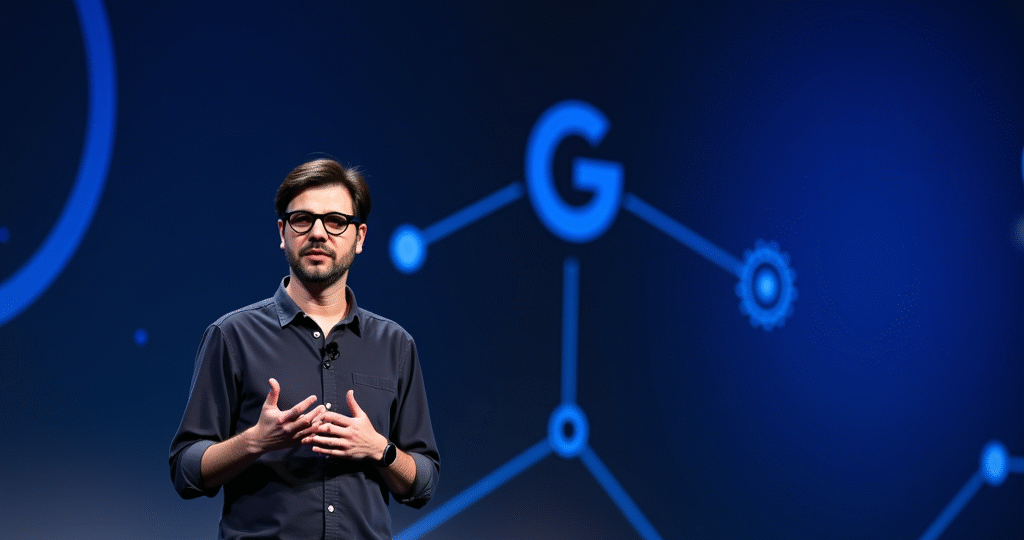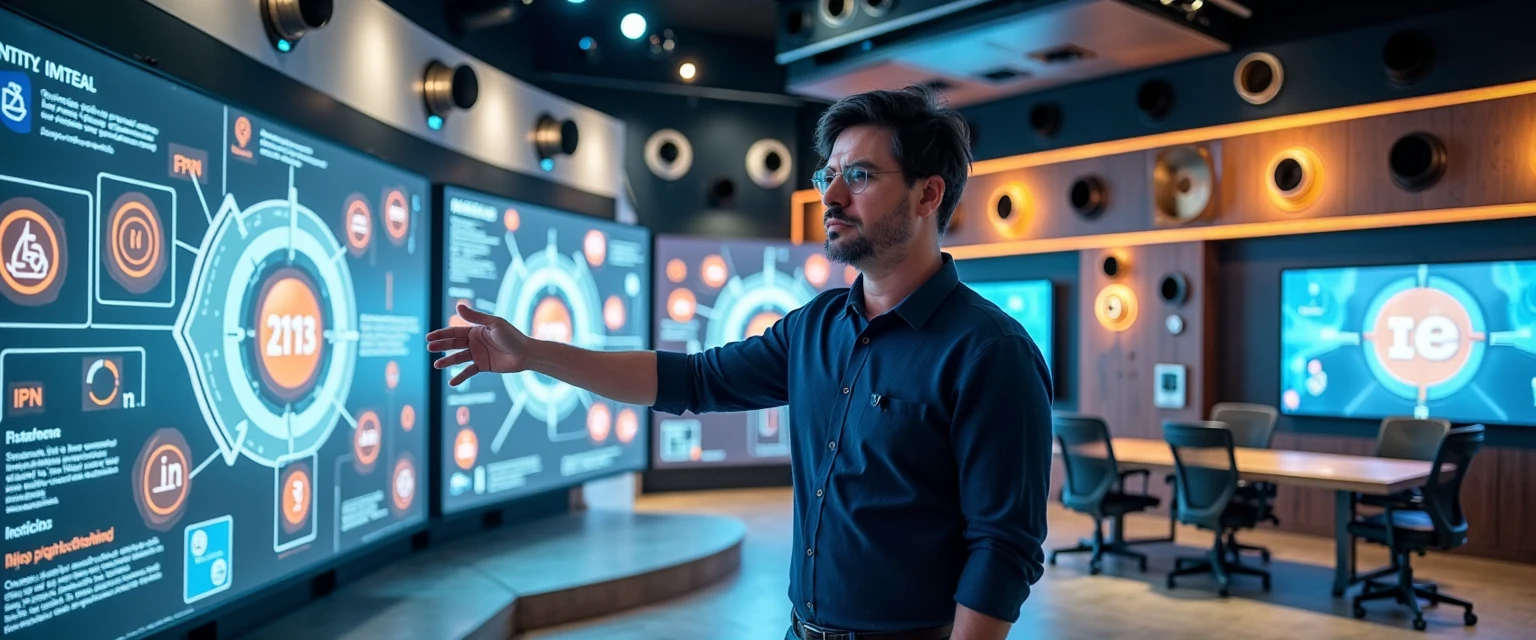AI Radar: Google Leads Nationalization of Technology While Scammers Advance – The Brazilian Panorama in 24h
June 11, 2025 | by Matos AI

The world of artificial intelligence is constantly changing, and the last 24 hours have brought significant news to the Brazilian scene. Google has taken center stage with two major announcements aimed at our country, while other technology companies are presenting strategic moves that will shape the future of the sector. Between technological advances and new risks, Brazil is beginning to chart its own path in the AI universe, with initiatives that could define our participation in this technological revolution.
Gaia: The first truly Brazilian large AI model
The most relevant news of the last few hours is, without a doubt, Google's announcement about the development of Gaia, an AI model specifically designed to understand and generate content in Portuguese. Developed in partnership with researchers from the Federal University of Goiás (UFG), this project represents a milestone for the accessibility of AI technology in Brazil.
Unlike simply translating existing models, Gaia was designed from the beginning with a focus on Brazilian language and culture. According to information from Estadão, this new model should substantially improve the performance of several Google applications and services used daily by millions of Brazilians, such as virtual assistants, translators and search tools.
Join my WhatsApp groups! Daily updates with the most relevant news in the AI world and a vibrant community!
- AI for Business: focused on business and strategy.
- AI Builders: with a more technical and hands-on approach.
This move is not only technical, but also strategic. While many companies limit themselves to translating interfaces, the development of a base model in Portuguese represents a new level of investment in the Brazilian market. The partnership with UFG is also noteworthy, as it demonstrates the potential of our public universities when they receive adequate support for applied research.
Google's new features package for Brazilians
In addition to Gaia, Google announced yesterday a set of AI features specifically aimed at the Brazilian market during the Google for Brazil event. One of the highlights is AI-powered simultaneous translation in Google Meet, which will be available in Portuguese in the coming weeks.
According to the Economic Value, this feature will allow users to listen to someone else's speech translated into their own language in real time, while maintaining the tone and similarity of the original voice. Portuguese will be one of the first languages to receive this expansion after English and Spanish, which highlights the importance of the Brazilian market for the company's global strategy.
This technology has the potential to transform international business, allowing Brazilian professionals to participate in meetings with foreign partners without the language barrier. For startups seeking global expansion, this could represent a significant facilitator in accessing foreign markets.
The other side of the coin: AI reduces traffic to news sites
Not all the news is positive, however. A report from UOL reveals a worrying side effect of Google's chatbot implementation in search: a significant reduction in traffic to news sites.
Data from Similarweb shows that organic search traffic has fallen dramatically on sites like HuffPost and the Washington Post, cutting by more than half. Google’s AI-generated summary at the top of the results page is replacing traditional search queries, reducing the need for clicks and impacting user traffic.
This phenomenon raises crucial questions about the business model of digital journalism. If this trend continues, media outlets will need to reinvent their revenue and distribution strategies. We are witnessing a profound transformation in the information ecosystem, with implications for the quality and diversity of journalism.
Veo 3: The visual revolution that blurs the boundaries of reality
Another significant development comes from Google's Veo 3 tool, which is revolutionizing the creation of hyper-realistic videos. As reported by G1, the technology allows you to generate scenes that are practically indistinguishable from reality from text commands, including characters, soundtracks and even specific accents.
The ease of creating compelling visual content opens the door to innovations in marketing, entertainment and education, but it also raises legitimate concerns about misinformation and manipulation. Not surprisingly, the report itself mentions the parallel development of technologies for detecting fake videos.
For entrepreneurs and content creators, Veo 3 represents an unprecedented democratization of visual production tools. What once required substantial teams and budgets can now be accomplished with just a few clicks. However, with great power comes great responsibility, and the ethical use of this technology will be a competitive differentiator.
The Dark Side: AI Powers WhatsApp Scams
The democratization of AI tools also has its dark side. A new scam on WhatsApp is using artificial intelligence to create fake job offers, the TechTudo. The tactic involves sponsored ads on social media that redirect users to WhatsApp conversations with supposed hiring companies.
The use of AI makes these scams significantly more convincing and dangerous, as it enables mass personalization and contextually appropriate responses that simulate human interactions. In a country with over 12 million unemployed people, job scams can cause substantial financial and emotional harm.
This scenario reinforces the need for digital literacy and the development of critical thinking skills in the population. Companies and HR professionals also need to adopt more robust verification practices and clearly communicate their official recruitment processes.
The Competitive Landscape: Meta, Apple, and the Race for Superintelligence
While Google is making rapid progress, its competitors are not standing still. Meta has announced the creation of a new AI research lab dedicated to the search for “superintelligence” – models that surpass the capabilities of the human brain in a variety of tasks.
According to Infomoney, the company has recruited Scale AI founder Alexandr Wang and is in talks to invest in the company for a multi-billion dollar investment. This reorganization of Meta’s AI efforts demonstrates the intensity of competition in the industry and the massive amounts of capital being invested.
Apple, meanwhile, appears to be taking a more cautious approach. Despite announcing the biggest software overhaul in its history, the company has made little progress on artificial intelligence, as reported by InfoMoney. Tim Cook and Craig Federighi have acknowledged the limitations of Siri's current architecture, suggesting that a version with integrated AI is not expected to arrive until 2026, according to the AllCellphone.
This difference in speed between the main technological players creates opportunities and challenges for the Brazilian ecosystem. On the one hand, intense competition accelerates innovation and can bring more resources to the local market; on the other, it intensifies the adaptive pressure on companies and professionals.
Brazilian initiatives: Inner AI launches national benchmark
In this scenario dominated by international giants, it is comforting to see genuinely Brazilian initiatives gaining ground. Inner AI has just launched the AI Scoreboard, a national benchmark aimed at guiding professionals in choosing the most effective AI models for each area of activity.
According to the Earth, the tool evaluates the performance of the main models in tasks that simulate the challenges faced daily by Brazilian professionals. The objective is to help the country make the most of technology with serious criteria adapted to our reality.
Initiatives like this are essential to building a more robust and autonomous national AI ecosystem. Developing our own metrics and standards is an important step towards ensuring that Brazil is not just a passive consumer, but an active participant in defining the direction of technology.
The Brazilian choice: surf or drown?
As I discussed in my recent article for Estadão, Brazil faces a critical choice in the face of the AI tsunami: ride the wave of innovation or drown in the consequences of inaction. Historically, our country has been conservative in adopting new technologies, which puts us at a competitive disadvantage.
The news over the past 24 hours has been mixed. On the one hand, initiatives like Gaia and the AI Scoreboard are moving in the right direction. On the other hand, we still face cultural resistance and concerns about the integration of new technologies into the job market.
To surf this wave, we need three fundamental elements:
- Accelerated education: Quickly train professionals capable of working with AI, from technical level to specialized postgraduate degrees
- Adequate infrastructure: Invest in data centers, connectivity and computing capacity to support AI applications
- Balanced regulatory framework: Create rules that protect rights without stifling innovation
The development of Gaia in partnership with UFG shows that we have the human capital and technical knowledge to actively participate in this revolution. What we need now is to scale these initiatives and create an enabling environment for more similar projects to flourish.
Conclusion: The time to act is now
The panorama of the last 24 hours reflects the dizzying speed at which AI is evolving and transforming all sectors. For Brazilian companies and professionals, there is no longer the luxury of waiting to see what happens.
Organizations that are able to integrate these technologies strategically and ethically will have decisive competitive advantages in the coming years. Those that resist change risk quickly becoming obsolete.
In my mentoring and consulting work, I have helped companies and entrepreneurs develop practical strategies to navigate this new world. My approach is not to adopt AI for the sake of it, but to identify specific areas where it can create real value and implement it gradually and responsibly.
Brazil has a window of opportunity to position itself as a relevant player in this technological revolution. We have talent, creativity and a substantial domestic market. What we need now is strategic vision and the courage to invest in the future.
Are you riding the AI wave or at risk of drowning? If you need guidance on navigating this new technological ocean, I’m here to help. In my mentoring sessions for startups and companies, we work together to develop AI adoption strategies that generate concrete and sustainable results.
✨Did you like it? You can sign up to receive 10K Digital's newsletters in your email, curated by me, with the best content about AI and business.
➡️ Join the 10K Community here
RELATED POSTS
View all



